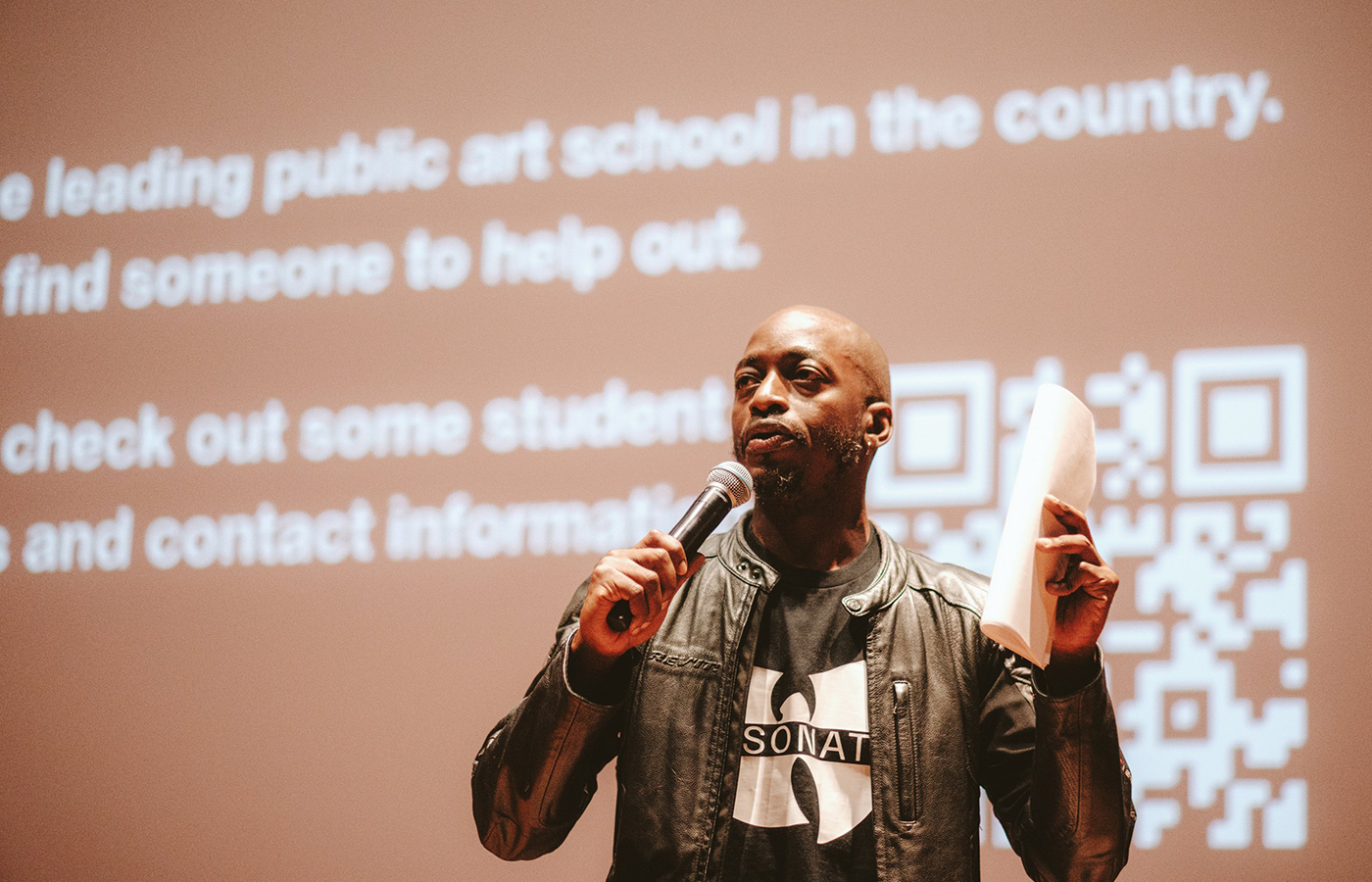
Arts & Culture
Open mic
Alum, audio producer and host Ronald Young Jr. on the art of vulnerability
Ronald Young Jr. (B.S.’07) has produced and hosted for Malcolm Gladwell’s Pushkin Industries and VPM’s critically acclaimed “Seizing Freedom,” which reveals stories of Black Americans who fought for everyday rights during Reconstruction.
His latest show, “Weight For It,” is about “navigating the world as a fat person when you feel like the world doesn’t fit,” he says. Young structures the first season’s seven episodes (released in late 2023 and available wherever you get your podcasts) around his daily life — shopping for clothes, pondering his desirability and, of course, ruminating about his body.
Podcasting is a medium that invites such mulling and openness. And “few hosts are as fearlessly candid” as Young, Reggie Ugwu writes in The New York Times. “Weight For It” was featured at the 2023 Tribeca Festival and won three 2024 Podcast Academy Awards. In October, the Alexandria, Virginia-based Young returned to Richmond and hosted a session on vulnerable storytelling at the Institute for Contemporary Art’s 2023 RESONATE Podcast Festival.
Young, who dabbled in event hosting while pursuing a criminal justice degree at VCU, says he’s always had the confidence to do this, even when he started “Time Well Spent,” his first podcast, in 2017. Here, he and Chioke I’Anson, Ph.D., director of community media at the VPM + ICA Community Media Center, discuss how vulnerability can deepen connection for us all. — Eds.

Chioke I’Anson, Ph.D.

CHIOKE I’ANSON: I want to talk about this idea of confidence. I teach, and a lot of students, the thing they’re missing the most is confidence. And this ends up preventing them from finding true possibilities for the things that they want to do. How did you develop this confidence, especially for something as public facing as hosting?
RONALD YOUNG JR.: Being in front of people and talking was never an issue for me because I did it [when] I was a child at church. There were your Easter speeches and your Sunday school recaps and the Christmas play — all types of public speaking gigs. By the time I got to college, even on a mic I already kind of knew what to expect. I had probably more time than the average person to hone my voice. I mean, by then I was doing announcements at church, and so I was reading [them] and being very critical of how they were written because I was like, “These announcements are written to be read. They’re not written to be announced.”
So by the time I started “Time Well Spent,” I felt more than capable. And I heard other hosts and I thought they were good, but I also imagined a lot of them did not have the history of being in front of an audience that I had by the time they got on mic. And it’s not “on-the-record” experience, but the type of repetition I’ve had just being in front of people.
CI: How did you come up with “Weight For It”?
RYJ: In the tagline, we say it’s a show about fat folks and others who can’t stop thinking about their weight. And, the truth is, a lot of people are thinking about weight, whether it be theirs or someone else’s. Fat is this cautionary tale that we try to avoid, and so we build a world that kind of separates us from fat people or excludes fat people.
For instance, air travel: When you get on a plane, the seats are not really designed for anyone. But when people are reacting while flying in an airplane next to a fat person, typically all the ire is directed at someone for being fat and not the airline for making a plane that doesn’t fit anyone. And the funny thing is, this wrath is not directed at tall people, who are also having a difficult experience [in the seat], or, for instance, if you have broad shoulders — straight size but broad shoulders. No ire directed at them. But if you need a seat belt extender, it’s, “Oh no, you’re infringing on my space.” And I’m [thinking], “Is that fair? Are we mad at the right people?”
I wanted to tell those stories. And I had seen it done with episodes like “The Weight of Love” from “Death, Sex and Money” and “Tell Me I’m Fat” from “This American Life.” But I hadn’t seen anybody kind of dwell on the topic, and that’s what I wanted to do.
CI: It’s a fantastic show. Every episode just grabs you by the heart. And they’re also revelatory in unexpected ways. You have an episode that’s simply about interacting with your doctor. [In the episode, Young loses 23 pounds in a few months. He visits his doctor for an unrelated reason, and the doctor, despite having seen Young for years, keeps advising him that he needs to lose weight and seems not to notice that he has.]
I’ve been in a doctor’s office, but I’ve never been you in a doctor’s office. And like, that’s it, right? It puts everyone into your perspective.
RYJ: I got a note today from someone: “Hey, I’ve been fat my whole life and I’ve never been able to articulate [the experience] to my mom. And we heard your episode on ‘Snap Judgment,’ and for the first time in my life, I felt like she got it because you articulated it well.”
“Snap Judgment” is a podcast and radio show in California and ran a combined version of episodes 1 and 2 of “Weight For It.” The majority is pulled from an episode called “The Shame Spiral” that talks about a relationship I had, when I went to VCU, with a young lady. At the time, I was straight sized and she was fat, and because of the ways in which my friends teased me for liking her, I felt ashamed of our relationship.
I got that note and I [thought], “That was the intent of the show” — to have these conversations that it feels like we’re avoiding when it comes to weight, like who we are attracted to, why we’re not attracted to them, why this person doesn’t appear to be a viable candidate for us. And I’m always thinking in terms of love, desirability and acceptance. But then there’s the logistical: These airplane seats are too small. They are too small for everyone. Yet the people that get ridiculed the most, or the people that have to deal with that the most, are fat folks.
So the success of the show, the critical acclaim, feels great. But for me, the emotional and existential impact is more important. And if “Weight For It” is another push toward getting everyone to be more compassionate, then I think that is a real success of the show.

